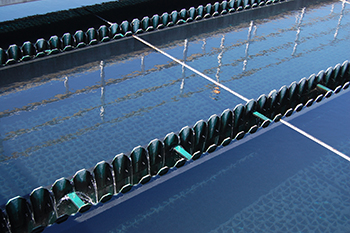Greeley’s summer water, which has sometimes been the source of taste and odor complaints in the past, remained complaint-free this summer. That’s a statistic the city is working to keep on trend as investments are made in our treatment plants, and out certified water operators continue perfecting the process to keep water great-tasting all year.
Greeley’s water, which is treated at two different plants, can have differing tastes after treatment, mostly due to the water’s origin. Sometimes in the summer, Greeley’s water from the Big Thompson storage system has a bit of an earthy taste, which doesn’t match up to what residents consume the rest of the year. Click here to see video about Greeley’s summer water quality.
Two treatment plants, very different water
Greeley’s two water treatment plants treat very different water. Its Bellvue plant treats water directly from Horsetooth Reservoir and the Poudre River, flowing downstream from high mountain reservoirs.  The Boyd Lake Treatment plant in Loveland, which is used to meet Greeley’s high summer water demand, takes Big Thompson water through a system of shallow reservoirs, which are more prone to increased temperatures and developing algae.
The Boyd Lake Treatment plant in Loveland, which is used to meet Greeley’s high summer water demand, takes Big Thompson water through a system of shallow reservoirs, which are more prone to increased temperatures and developing algae.
While we had great tasting water all year in 2021, there is more work to be done to assure that continues year-round. Greeley’s Boyd Lake treatment systems are about to get an upgrade – a $10.3 million upgrade, which will help Greeley’s water treatment remain consistent throughout the year.
Time for necessary upgrades
The need for treatment facility upgrades is two-fold – we can count on nutrients (urban and agricultural runoff) in the water developing algae blooms, which create the earthy taste, especially in the summer heat. Second, the facility needs better laboratory analytics to identify algae compounds early and enhanced treatment facilities to neutralize the taste and odor byproducts.
The water treatment process at Boyd involves infusing powdered activated carbon into the water to absorb the algae, which bulks up for easy removal. Though it works and is completely safe, activated carbon is very expensive and must be removed after treatment, creating a lot of byproduct waste. The trick is getting the dosage as precise as possible to maintain Greeley’s high standards, while minimizing treatment costs. That’s where creating an in-house lab at the Boyd Treatment Facility and planning for additional process improvements that will limit the activated carbon dosage come in.
A chief reason the city hasn’t created an in-house water-testing lab before is because of expense and specific technical expertise. The analysis of the water is not simple, and the machine that does it must be calibrated constantly.
While it complex and expensive, the city can save money by getting the dosage of carbon precise.
Reducing chemicals through technology
Long-term, the plan is to eliminate as much powdered activated carbon as possible from the treatment process by investing in advanced process improvements. Though still a good four years away, the city hopes to replace the use of its PAC with ozone/peroxide treatment. Ozone is a chemical process that breaks down the taste and odor compounds rather than absorbing it as with powder activated carbon.
Crews also will install a liquid oxygen (LOX) system in Boyd Lake to increase the level of dissolved oxygen (DO) in the water to bolster water quality and help prevent oxygen depletion in the lake. When the DO level gets low in the lake it pulls minerals out of the soil in the lake bottom, which add to treatment challenges. The project consists of a new chemical building that will house the caustic, chlorine and the peroxide system for the ozone process. Crews will erect a building to cover existing chemical tanks. Equipment and machinery also will be upgraded.
Long-term consistency is the goal
The end goal is to reduce taste and odor issues permanently, reduce chemical usage, and winterize the facility to it can run year-round if needed.
With Boyd operating as a year-round back-up, Greeley will be much more able to switch between the two treatment plants for operational maintenance needs at any time. And, last, having two is much better than one. This way, the city of Greeley can ensure consistent, year-round water that tastes great and keeps flowing.